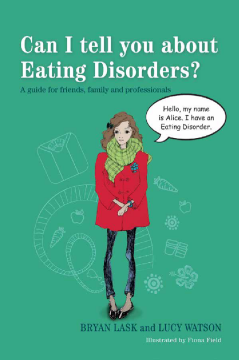
Additional Information
Book Details
Abstract
Part of the Reading Well scheme. 35 books selected by young people and health professionals to provide 13 to 18 year olds with high-quality support, information and advice about common mental health issues and related conditions.
Meet Alice - a teenage girl with anorexia nervosa. Alice invites readers to learn about anorexia nervosa and how it makes her see herself differently from how other people see her. She also introduces readers to Beth who has bulimia nervosa, Sam who has selective eating problems, Francesca who has functional dysphagia and Freddie who has food avoidance emotional disorder. They all explain why they find food difficult and how their eating disorders are different.
This illustrated book is an ideal introduction to understanding the complex issues surrounding eating disorders. It shows family, friends and teachers how they can support a young person with an eating disorder and will also be a good place to start when encouraging open conversations about eating disorders at school or at home.
Professor Bryan Lask was Emeritus Professor of Child and Adolescent Psychiatry at St George's, University of London, UK, Medical Director at Rhodes Farm, Care UK, and Honorary Consultant Psychiatrist at Great Ormond Street Hospital for Children. Lucy Watson is an Assistant Psychologist at Great Ormond Street Hospital and Care UK. She is the Editorial Assistant for the journal 'Advances in Eating Disorders: Theory, Research & Practice', co-edited by Professor Bryan Lask and Dr. Rachel Bryant-Waugh. Fiona Field is an artist and art teacher who has taught art at several schools and colleges. She presently lectures in drawing and painting at the School of Art and Design in Worcester.
This highly readable little book for children, family members and concerned friends, strikes just the right tone with its matter-of-fact, clear and sympathetic information. There is nothing like it that we can use to help people understand what our patients go through. I will certainly be using it for mine.
Julie O'Toole M.D., M.P.H., C.E.D.S., Chief Medical Officer Kartini Clinic, Portland, Oregon
This book is an introduction to eating disorders and aims to act as a guide for friends, family and professionals alike. It has been specifically written for young people aged between seven and fifteen years old, offering a simple structure that is easy to follow... Overall, this book is a helpful tool for those who want to know more about this topic. The book cover five main Eating Disorders, which are discussed by five different characters... Together these characters take the reader on a learning journey. In addition to offering factual information on eating disorders, Alice and her friends reveal the emotional impact it has on them... The book also touches on the causes of eating disorders... Further information on specialist organisations are provided at the end of the book... this book is brief but really helpful, as it gives young people with eating disorders a voice.
Play Therapy
Five different children tell us about their eating disorders and how it affects their lies... Their dialogue consists of what they do and why and how their friends and families react to their problems... it is clear and concise and gives details about the lesser known types as well... Black and white illustrations add much to the text, and each child gives us a list of ways that we can be sensitive and help. There are a few organisations listed at the back of the book. This is one of an excellent series on different health problems and disabilities.
Healthy Books blog
Readers learn about the different types of eating disorders...Through dialogue and illustrations, the characters describe their body image and physical appearance, emotions they experience during eating situations, as well as the factors that led to their illnesses. Their explanation of emotions-especially shame, guilt, and anxiety- is particularly helpful for those trying to understand the inner life of those suffering from eating disorders... The book concludes with recommended reading and websites for more information about eating disorders. Although slim (65 pages), Can I Tell You About Eating Disorders? is a helpful resource for health and education professionals, as well as an informative guide for peers, friends, and family members.
The AED Forum (The Academy of Eating Disorders Newsletter)
This thoughtful and practical book focuses on what matters from the perspective of children with eating disorders; what helps, what doesn't, and most importantly, how to see the child not the disorder. It will be a great support for siblings and friends and an invaluable resource for care providers in the field.
Josie Geller, Ph.D., R.Psych., Director of Research, Eating Disorders Program, St. Paul's Hospital Associate Professor, Department of Psychiatry, University of British Columbia
This illustrated book is an ideal introduction to understanding the complex issues surrounding eating disorders. It shows family, friends and teachers how they can support a young person with an eating disorder and will also be a good place to start when encouraging open conversations about eating disorders at school or at home... Friendly characters invite readers to learn about their experiences, the challenges they face, and how they would like to be helped an supported.
In Our Hands blog
